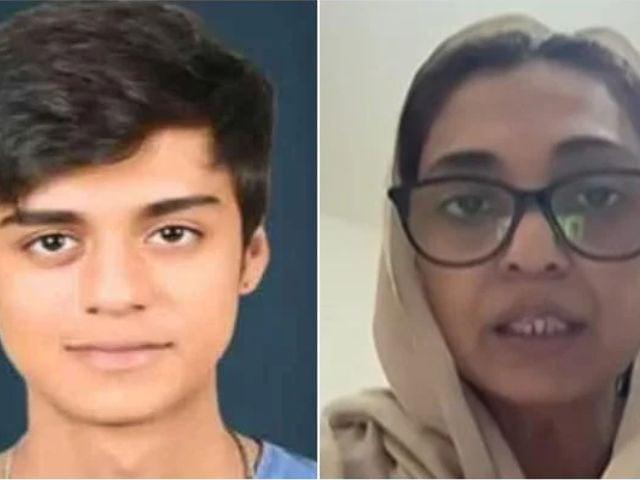The mother of the murderous youth Mustafa Amir has firmly rejected any Diyat offer (blood money), demanding justice for the brutal murder of her son.
Wajiha Amir, while talking to the local news channel, declared that he wanted the case to reach his legal conclusion and that he would not accept a financial agreement under any circumstance.
His comments occurred after he allegedly approached the family of the main suspect, Armaghan, during a recent judicial hearing. She said that Armaghan’s mother tried to negotiate, arguing that her son had no financial reason since he was already rich.
Mustafa Amir was kidnapped and allegedly murdered by her friends on January 6 at the Karachi Defense Housing Authority (DHA). Police say that his body was involved in the trunk of his car and then caught fire in the Baluchistan hub area.
Speaking about the events that led to the death of his son, Wajiha Amir revealed that Armaghan had lied about Mustafa’s whereabouts when he desperately asked for answers.
In addition, he claimed that Armaghan and Mustafa had a long -standing rivalry, worsened by the jealousy and negative influences of the social circle of the suspect.
As the investigation continues, Wajiha Amir, along with a social welfare organization, directed a protest for the adolescent Talwar of Karachi, demanding justice.
The protesters had banners and banners, asking for justice for Mustafa. The demonstration also had a vigil in the light of the candles in the memory of Mustafa, with his mother actively participating.
In addition, a judge who manages the case of Mustafa Amir murder was stripped of administrative powers after a panel of the Superior Court found irregularities in his decision to deny the preventive detention of the accused police.
The ruling follows the accusations of manipulation of records and judicial overreach, which caused concerns about the integrity of the procedures.
A bank of two members of the Sindh Superior Court, led by Judge Zafar Rajput, issued a detailed verdict, ordering that the judge of the Anti -Terrorist Court (ATC) Zakir Hussain be eliminated from his administrative role.
The Court found significant procedural violations, including inappropriate management of remunciation requests and unauthorized changes to official documents.
According to the ruling, the judge exceeded his authority by denying the accused’s police custody, Armaghan, despite the investigators who present evidence.
The decision was particularly controversial since the judge initially approved the preventive detention of the police, but then altered the order to judicial custody through the use of correction fluid.
The ruling of the Superior Court highlighted serious lapses in case management, stating that Judge Hussain kept the investigative officer waiting for three hours before verbally instructing a medical examination of the accused.
This delay, the court said, hindered the investigation process.
The verdict also indicated that the judge issued an order for a joint investigation team (JIT) in the case, a decision that neither the prosecution nor the defense had requested.
The attorney general and police officers challenged this directive, arguing that it was issued without adequate legal motives.
A medical examination of Armaghan found marks of injuries at the bottom of the body, the forehead, the ear and the neck.
However, the legal medical officer report did not confirm whether these injuries resulted from police torture.
The judge had cited accusations of police brutality as a reason to deny the return, but the Superior Court did not find sufficient evidence to justify its decision.
The Sindh Superior Court ordered the President of the Supreme Court and the Secretary of the Interior to reallocate the administrative powers of the judge to another anti -terrorism court in public interest.
The verdict emphasized that the judges of the Court of First Instance are responsible before the Superior Court and must follow the appropriate legal procedures when making decisions about the orders of custody and investigation.
The ruling also ordered that copies of the decision be sent to the president of the Interim Sindh of Sindh and the provincial interior secretary, ensuring that the matter is formally reviewed at a higher judicial level.




